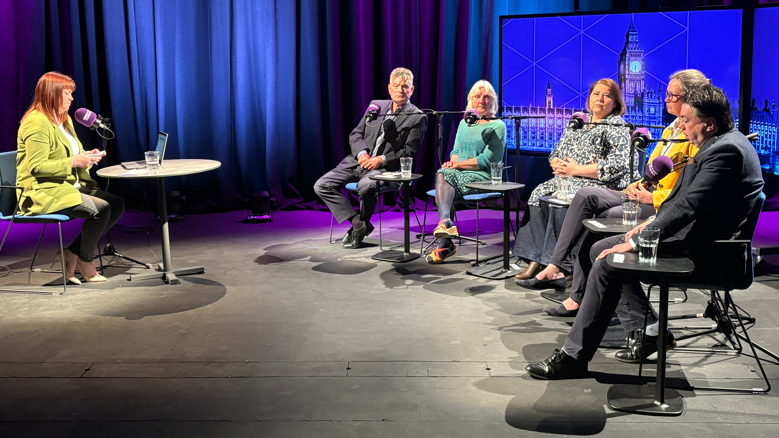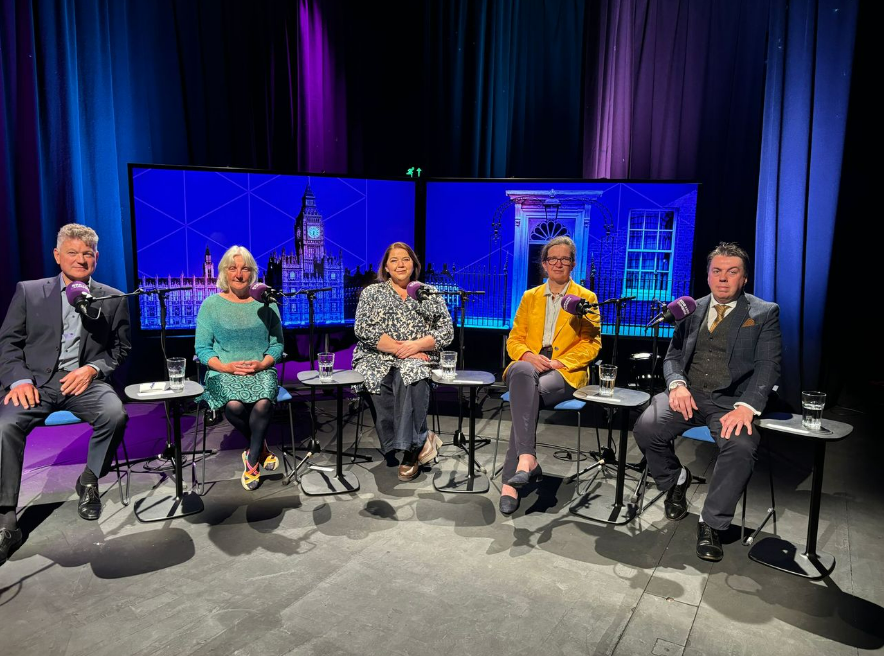Key takeaways from the BBC Cumbria election debate

The debate involved politicians from across the BBC Cumbria region
- Published
Housing, transport, the cost of living and the splitting of Cumbria County Council back in 2023 were among the key issues at the Your Voice, Your Vote general election debate in Cumbria.
BBC Cumbria's Steph Finnon put questions, provided by local people, to politicians at the University of Cumbria's Brampton Road campus.
The Conservatives, Labour, Liberal Democrats, Reform UK and the Greens fought to convince viewers and listeners they had the answers to voters' concerns.
1. They all have a plan for housing
Housing is a major issue in large parts of Cumbria, with a lack of affordable homes in areas where many are used as tourist accommodation.
There was some agreement about the need to build more homes and tackle excessive numbers of holiday homes, but the different parties also have distinctive policies.
Labour is calling for a major reform of the planning system to kick-start a building spree.
Julie Minns, the party's candidate for Carlisle, said: "We have to get Britain building again.
That means planning reform; that means recruiting hundreds more planning officers."
The Reform UK candidate for Penrith and Solway, Matthew Moody, said a large number of empty homes "could be utilised, if we had a public-private partnership in place to do that".
The Green candidate for Whitehaven and Workington, Jill Perry, said the party had a plan "to build 150,000 social homes every year."
And the Conservatives pledged new powers for councils to help control holiday lets.
"People are going to have to apply for planning permission for future home lets, so it gives the local authorities some sort of control", Mike Starkie, the Tory former elected mayor of Copeland said.
Liberal Democrat candidate for Penrith and Solway, Julia Aglionby, called for a planning system where houses were "allocated for permanent residency, not as second homes, not as holiday lets."
2. Who (or what) is to blame for the cost of living crisis?
The parties clashed over the cost of living, with Labour and the Lib Dems blaming the government for rising prices, while the Conservatives insisted ministers had helped people through a crisis caused by external factors.

(From left to right) Mike Starkie, Jill Perry, Julie Minns, Julia Aglionby and Matthew Moody took part in the debate
3. Local council woes
There was a heated debate about the financial implications of splitting up Cumbria into two unitary authorities last year.
In 2023, Cumbria County Council was broken into Cumberland Council and Westmorland and Furness Council - replacing the county council and the existing six district councils of Carlisle, Allerdale, Copeland, Eden, South Lakeland and Barrow.
When asked about the strain on the NHS and social care, Mr Starkie (Conservative) said the local authority in Carlisle "needed to get its act together".
Mr Starkie said the government had committed to a multi-year funding settlement for local authorities to use for adult social care.
But when questioned on why the settlement was coming in now, when councils had been struggling for years, Mr Starkie said: "Well, the council hasn't been performing for years. It's been making a complete hash of adult social care."
Ms Aglionby (Liberal Democrats) said: "By splitting Cumbria in two, you have increased costs for Cumbria.
"You've made it much more expensive to run the local authorities.
"We've had two or three years of chaos where your Government has decided to split Cumbria.
"We now have to have double the number of directors, double the number of assistant directors, money is not getting to the people on the front line."
The comments drew nods from the other politicians.
Mr Starkie responded: "I would add that the government funding into the health service, into the NHS in general, now is at record levels.
Julie Minns (Labour) disagreed saying: "Waiting lists are three times what they were in 2010, this is one of the reasons why we have such an issue in social care.
"I'm a carer, I look after my 90 year old mam, navigating social care has been really fraught."
4. Big plans for buses
Unexpected agreement broke out between Labour and the Conservatives over transport.
Both thought new local powers and an elected mayor could boost local services, but argued over which party was responsible for a current lack of buses in the county.
Ms Minns praised the Labour-run Greater Manchester combined authority for taking control of public transport and criticised a government ban on municipal bus companies.
But Mr Starkie said local Labour and Liberal Democrat leaders were to blame for not securing a devolution deal for Cumbria, which the two parties denied.
5. Why the Conservative candidates declined to take part
BBC Cumbria had approached the county's general election candidates for the Conservatives, but they declined to take part.
They criticised the BBC’s decision to hold a Cumbria-wide debate, arguing it would not provide enough scrutiny of "the issues affecting this incredibly diverse county".
They said they would have taken part in debates for each local constituency, had the BBC held them, as had happened at previous elections.
A spokesperson for the BBC said: "This debate went out live on the website, on Radio Cumbria, on BBC iPlayer, on BBC Sounds, and is also being reflected on Look North."
"The debate focused on issues affecting all people living in Cumbria," it added.
The full hour-long debate is available to view on iPlayer here and here is a full list of general election candidates in each constituency here.

Follow BBC Cumbria on X (formerly Twitter), external, Facebook, external and Instagram, external. Send your story ideas to northeastandcumbria@bbc.co.uk